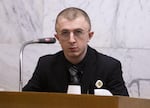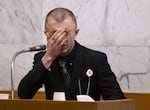Micah Fletcher did not immediately realize he had been stabbed.
“Originally, I thought he punched me,” said Fletcher, the survivor of the 2017 MAX train stabbing attack in Portland. “I realized there was blood on my fingers and thought, ‘that’s odd.’ Then I realized there was blood on my shirt, a lot of it. Then I realized it was coming from my neck.”
Fletcher, 24, took the stand Tuesday, in the prosecution’s continuing case against Jeremy Christian, the man charged in the attack.

Highly anticipated testimony from Micah Fletcher, who was seriously injured at the MAX stabbing incident, came on the morning of day six of the Jeremy Christian trial in Portland, February 4, 2020.
Beth Nakamura / The Oregonian/OregonLive/Pool
When asked by Jeff Howes, first assistant to the district attorney, if he was nervous, Fletcher responded: “Absolutely.”
Along with wounding Fletcher, Christian is accused of fatally stabbing two people aboard a MAX light rail train.
Howes began his questioning by asking Fletcher about his life: being born and raised in Portland, being diagnosed with autism spectrum disorder at a young age and engaging in poetry slams and other similar events in high school.
“In middle school, all three years, I was jumped at least twice a week. A group of anywhere from five to nine people would physically assault me,” Fletcher said. He said experiences like that shaped him, informing his strong societal and political beliefs.
Fletcher said he’s not part of any groups that organize political protests and rallies, but said he attended some in the past.
After being asked by Howes, Fletcher said he had been arrested at a protest in Vancouver, Washington — accused of throwing a smoke bomb. Fletcher said he pleaded guilty, participated in a diversion program and the charge was dismissed.
Howes also questioned Fletcher about another protest that he attended in Portland’s Montavilla neighborhood, in April 2017. At that event, Fletcher dressed as a clown and was juggling — a way of protesting through “whimsy,” Howes said.
“It is just less scary for other people,” Fletcher said. “If I’m able to show up in a way people would laugh at instead of looking intimidating, I would prefer it.”
Fletcher said he saw Christian at the event that day, giving a Nazi-style sieg heil salute. He said Christian called it a “viking salute.”
Howes directed Fletcher to describe the day on the MAX train, when he first heard Christian yelling.
Last week, witnesses said Christian was shouting racist comments while two black teenage girls — Walia Mohamed and Destinee Mangum — were nearby on the train, and people had stepped in to intervene. Mohamed is Muslim and was wearing a hijab.
Fletcher said that was why he originally confronted Christian.
“I saw what appeared to be a gentleman with a ponytail screaming at what appeared to be two young women,” Fletcher said. "Just very angry. Just very, very angry.”
Fletcher said Christian was yelling about Saudi Arabia and “getting the fuck out of America.”
Fletcher, who was on the elevated section of the train, said he went down toward Christian and yelled at him to “Shut the fuck up. You can’t yell at kids like that.”
“I think I said something like, ‘That’s fucked up. You can’t do that,’” Fletcher said.
“Did you think that was appropriate to do?” Prosecutor Howes said.
“That wasn’t something I was considering,” Fletcher replied.
Fletcher said he continued riding the train and Christian continued ranting. At one point he turned away from Christian. Then he heard a loud noise, which was the sound of Christian knocking Taliesin Namkai-Meche’s phone out of his hand — when Namkai-Meche attempted to approach Christian and videotape his rant.
Fletcher thought Christian had hit Namkai-Meche.
“I’m certain of it in my mind at the time,” Fletcher said. “I immediately rush toward the two of them and try to get in between them before the situation can escalate.”
Fletcher described Namkai-Meche as someone who he assumed “had never been in a fistfight in their whole life.” Fletcher said Namkai-Meche did not look like he was prepared for a fight, which is why he stepped in.
Fletcher said Christian shoved him and then shoved Namkai-Meche. Fletcher grabbed Christian by his collar and the shoulder of his shirt to try to move him away from Namkai-Meche.
Howes asked Fletcher why he acted after Namkai-Meche was shoved, instead of after he himself was shoved.
“Because it wasn’t about me,” Fletcher said. “This wasn’t about feeding my ego and protecting myself. It was about protecting the other person and making sure he wasn’t hurt.”
Fletcher said he yelled at Christian to get off the train. He did not notice at the time that Christian had pulled out his knife and was holding it open by his side.
Fletcher testified that Christian continued egging him on, saying things like “hit me again, I dare you.” Fletcher pushed him again.
“He responded by stabbing me in the throat,” Fletcher said of Christian.

Micah Fletcher becomes emotional as he testifies about the experience of thinking he was going to die, and having to call his mother. Highly anticipated testimony from Micah Fletcher, who was seriously injured at the MAX stabbing incident, came on the morning of day six of the Jeremy Christian trial in Portland, February 4, 2020.
Beth Nakamura / The Oregonian/OregonLive/Pool
Fletcher said he exited the train as quickly as possible without trying to raise his heart rate too much.
“At that point, I realized that’s a given … That I’m going to die,” Fletcher said.
He recalled going to the train platform and being helped by Marcus Knipe, another witness who testified last week.
Knipe stayed with Fletcher, applying pressure to his wound, and waited for medical personnel to arrive.
Fletcher detailed how he asked Knipe to call his mother. He said Knipe lied to his mother, saying Fletcher had been stabbed in the arm so as not to worry her. Then he passed the phone to Fletcher.
“I told her I loved her and that I’d see her soon,” Fletcher said. “I asked her as an aside that she call my work and tell them I wouldn’t be in today.”
Recounting that phone call was one of the only times Fletcher appeared to get emotional on the stand, pausing at points during the conversation.
Other than that, Fletcher appeared stoic and analytical, often asking for clarification on questions as he deemed necessary.
During its cross-examination of Fletcher, the defense mostly questioned Fletcher’s motivations, dissecting his thought process and why he decided to act as he did.
One of Christian’s defense attorneys, Dean Smith, brought up the presence of another person on the train — Shawn Forde, who testified last week.
In his testimony, Forde said he had also attempted to step in when Christian was ranting near the two black teenagers. Forde said he stood in front of Christian to direct his attention away.
Forde was already standing in front of Christian when Fletcher approached Christian, the attorney, Smith, said.
“Do you think if you would’ve taken that time, you would’ve realized that Mr. Forde had already diverted the attention to himself?” Smith asked.
“It’s possible,” Fletcher replied.
Smith also asked Fletcher if he thought he took the right actions to deescalate the situation.
Fletcher said, now, maybe not, “because it was loud and that’s not very deescalative (sic); it’s not necessarily escalative either.”
Smith moved onto questioning about Christian’s interactions with Namkai-Meche.
“Once you got involved, it seems as though your effort was to get Mr. Christian away from Mr. Namkai-Meche for one, and getting him off the train,” Smith said.
“Yes, for one, but … I wasn’t planning on physically dragging him off the train,” Fletcher said. He said he was instead trying to encourage Christian to consider his options and realize that leaving the train would be the best decision.
Smith shifted questioning to the rally Fletcher attended in the Montavilla neighborhood.
“My understanding was that it was a ‘Free Speech Rally’ was the name of it, and a number of different groups would be attending to rally for free speech … and opposing parties believed this was a guise for right-wing groups to march in the streets of Portland under the guise of free speech,” Fletcher said.
Smith also asked if Fletcher was a part of the group counter-protesting. Fletcher said he was not directly affiliated with the group, but showed up after seeing a flyer.
Smith described Fletcher and others at the rally making noises with clown horns. He asked Fletcher if that could be interpreted as “interfering with free speech.”
“I’d describe it as people honking their horns at a rally,” Fletcher said. “No one’s putting their hand over their mouths.”
Smith also brought up Fletcher’s attendance at other counter protests of far-right groups.
Howes, with the prosecution, pivoted back to Fletcher’s actions on the MAX train, asking Fletcher again why he stepped in for Namkai-Meche.
“I did that because I believed at the time it was the right thing to do,” Fletcher said. Fletcher reiterated he had attempted to get Namkai-Meche out of Christian’s way and put the focus on himself.
“But what happened?” Howes asked.
“He died and I got hurt. I was wrong. I didn't save him,” Fletcher said. “I really wanted to and I couldn’t. I just wasn’t strong enough.”
Howes asked Fletcher if he would make the same decision today.
“Yeah, I wish I could say I wouldn’t,” Fletcher said, “But I really do believe I did the best I could.”
The prosecution will continue its case Wednesday. Christian’s defense attorneys will present their case after the prosecution rests. The trial itself is estimated to last through February.